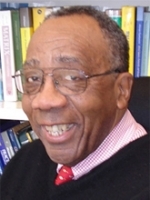Donald J. Brown
Phillip R. Allen Professor of Economics and Professor of Mathematics
 Donald Brown, B.A. University of Colorado, M.Sc. Pennsylvania State University, Ph.D. Stevens Institute of Technology: You are part of a distinguished line of mathematicians who transformed economics into a disciplined body of precisely stated and testable propositions. After earning a Ph.D. in mathematical logic you joined the Cowles Foundation at Yale in 1969 as a researcher and lecturer. Without benefit of any formal training in economics, you rose to assistant professor, professor, and chair of the department. You were the first African American economics professor in Yale’s history.
Donald Brown, B.A. University of Colorado, M.Sc. Pennsylvania State University, Ph.D. Stevens Institute of Technology: You are part of a distinguished line of mathematicians who transformed economics into a disciplined body of precisely stated and testable propositions. After earning a Ph.D. in mathematical logic you joined the Cowles Foundation at Yale in 1969 as a researcher and lecturer. Without benefit of any formal training in economics, you rose to assistant professor, professor, and chair of the department. You were the first African American economics professor in Yale’s history.
Driven by intellectual curiosity, always eager to learn new methods and new approaches, you have made contributions to economics that are remarkable in their variety, originality, and depth. Each time you changed fields you insisted on changing offices. Most professors rarely clean their offices, much less clean them out. Yet you moved to each of the four economics buildings, the math department, the political science department, and SOM. Once you even changed universities, moving to Stanford from 1988 to 1995! You filled every building you sat in with laughter and enthusiasm.
Your first major work in economics, some of it done jointly with the eminent Yale mathematician Abraham Robinson, was to represent the concept of perfect competition by an economy with an infinite (nonstandard) number of infinitesimal agents. Moving across the street and working with Geoffrey Heal, you illuminated the major problem of economies of scale. Sitting in the math department, you wrote a paper on missing financial markets with Peter DeMarzo and Curtis Eaves. Moving back to Cowles, you wrote “Testable Restrictions on the Equilibrium Manifold” with Rosa Matzkin, initiating an entirely new subfield of econometrics that has been actively pursued by many subsequent scholars. Changing offices again, you turned to yet another field: experimental and behavioral economics.
You took particular pleasure in inspiring and mentoring the young. You were three times director of undergraduate studies—and you were not just any ordinary DUS. Great friend of the associate deans of Yale College, with whom you often wrestled ideas, you deeply cared for all aspects of the development of undergraduates and wholeheartedly gave yourself not only to them but to all that you believed would be best for their nurture and support. You ran one of the first summer programs at Yale for mentoring and supporting underrepresented minorities, and, always one for the new, you were among the first to offer online summer courses. Even after retiring, you will be teaching two courses this summer.
Ace tennis player, you have been on your game in economics for more than forty years, and as you retire your colleagues are pleased to call the game as they see it: point, game, set, match to Don Brown.
Tribute Editor: Penelope Laurans